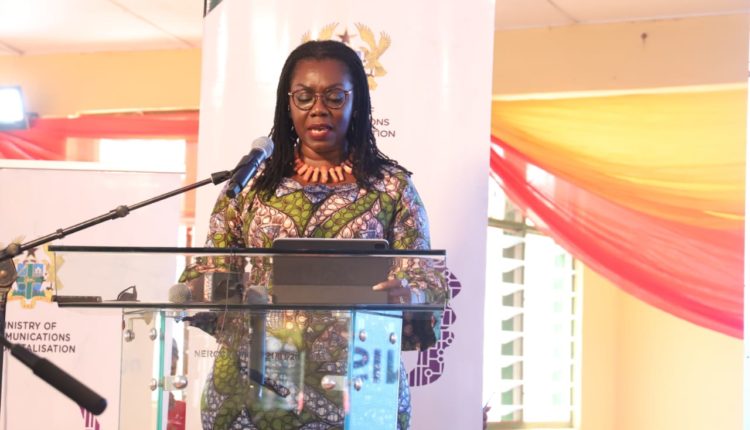Minister of Communications and Digitalization, Mrs. Ursula Owusu-Ekuful has asked other Africa leaders to learn from Ghana and also champion the digitalization agenda to enable their economic and future gains to be incredible.
She said digitization has huge prospects in supporting rapid prototyping of ideas, seeding digital innovations, targeted business incubation and acceleration programmes in the digital industries, and also help to mitigate some of the challenges identified within the tech ecosystem.
Speaking at the High Level Seminar on Accelerating Digital Transformation: Realizing Dakar’s Call to Action in Western and Central Africa in Washington DC, Mrs. Ursula Ekuful said, Ghana’s digitalization agenda has shaped a lot of sectors in the economy.
She urged other leaders on the Africa continent to emulate same in ways to drive financial inclusion, closing information gaps, and changing the way of work despite challenges that may encounter from the initial stage of its implementation.
Women factor
Mrs. Ursula Owusu-Ekuful further said, digitalization which has become the future prospect for growth and development cannot be achieved without the addition of women.
She argues that, women have a vital role to play in such prospect to make it a reality by achieving its purpose of reshaping the Africa economy, driving financial inclusion, closing information gaps, and changing the way of work, living, among others.
In addition, she said the addition of women into the digitalization agenda has the potential of driving away poverty alleviation and boosting shared prosperity in West and Central Africa.
She further indicated that, despite the challenges to access and affordability, digitalization in West and Central Africa is a huge opportunity and the region is showing tremendous potential for it with the inclusion of women as the goal.
Digitalization, according to her holds the opportunity to help the Africa region address fragility, boost financial inclusion, and develop job opportunities beyond measures, adding that, public services are going online, entrepreneurs are building startups, and development partners and the private sector are increasingly financing the digitalization of services in many Africa countries.
This she said, should continue as an urgent agenda to help deepen reforms and attract the necessary investments for increased digitalization of services, which will be an essential condition for youth development, ending insecurity and instability.
“We believe that digital inclusion provides the surest way to empower our youth, especially the girl child to succeed in the 4th industrial revolution which is unfolding. If we give our young people the digital skills they need today, they can provide the Human Resources for the global world of work because of Africa’s demographic dividend and solve multiple problems including youth unemployment, insecurity and instability. The future is digital and the future is women!! It starts today and enables women to work flexibly and innovate freely” she said.
Good Path
Ghana, she indicated has gained and seen tremendous progress in every sector of the economy since the aim to shift to the digitalization side.
“Our digital transformation journey has been challenging yet very exciting. Challenging due to continuous demand for resources from all sectors to digitize and improve business processes but the excitement is from the modest gains achieved with relatively minimal investment. Since 2017, our government has taken deliberate steps to formalise our economy through digital technology. We have focused on foundational digital infrastructure to enhance connectivity, reskilling and upskilling our youth, and building interoperable platforms and a single national database on our national E ID which is linked to Ghana Revenue Authority and Tax identification Numbers (TIN) to enhance tax administration and compliance, E ID is also linked to Health Insurance, SIM registry, Pensions Authority, Companies Registry, DVLA, Passports, Digital address system, etc.”
She added, “We are also focusing on strengthening the regulatory oversight on Electronic transactions by building the capacity of the National Information Technology Agency and other regulators in the sector including our Cybersecurity Authority and have just launched the AfCFTA hub as a one stop shop for all e commerce, e logistics, courier companies, MNOs, payments systems operators, standards authority, FDA and the key regulators in the sector NCA, PCRSC, CSA, DPC, among others to promote trust and facilitate easy uptake of trade within Ghana and with Ghanaian companies.”
She said, Ghana’s achievement over the period in the digitalization agenda has been to successfully improve connectivity to all regions of the country, creating the enabling environment for the private sector to further invest and thrive, implementing a Rural Telephony and Digital Inclusion Project (GRT&DIP), building over 300 high school digital labs for students and teachers use, digitizing Parliament and Cabinet – Public Procurement Systems which she indicated is projected to save the country in excess of USD 100 million dollars per annum – digitalization of the Judicial systems and Office of the Attorney General.
Also, digitizing the Birth and Deaths Registry, Registrar General Department, Office of the Attorney General, Ghana Revenue Authority, Immigration, and critical utility agencies like the Electricity Company of Ghana ECG, Ghana Water as well as additional government payments platforms such as the GIFMIS and GHANA.GOV platforms, among others.


Comments are closed.